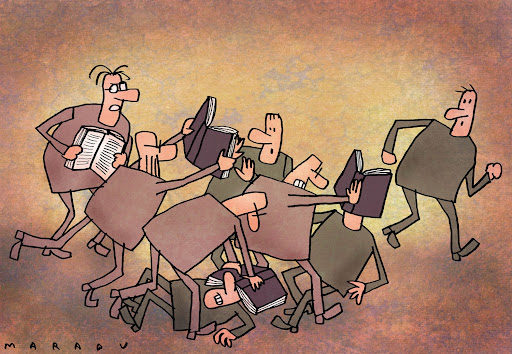Liberalism and the perception and political behavior that have been dividing our society for 30 years are the subject of heated debates in Hungary since 1989-90, i.e. the regime change. From a Western, especially American perspective, it is not particularly striking, but in our country and in Central and Eastern Europe, it is by no means considered generally accepted.
There, the 12 points of the anarchist Saul Alisnky ("attack, attack, attack from all directions, never leave a chance for the faltering organization to rest...") have been accepted for a long time, but are relatively new here. Alinsky's encouragement took root only fifteen or twenty years ago:
“It's not just the power you have, but the power your opponent thinks you have. Power has two sources: money and people. Those who have no money should build power from their bodies.”
And so on.
In other words, discrediting the political opponent with sexual means, involving their family and relatives in the fight, ordinary slander, distortion and silence - with a strong media tailwind - have been experienced in our country for quite some time. The tools of neoliberalism are extremely effective, not only in domestic but also in foreign policy, on the battlefield of the EU, especially in Germany, the Benelux and the Scandinavian states. Whether it's about illegal migration, the relationship between the sexes, the interpretation of freedoms and the over-expansion of judicial power (see: "juristocracy"), subsidiarity - originally one of the pillars of the EU - being pushed into the background and unification, in other words, the total economic-political union , that is, about the increasingly intensive spread of imperial thinking. It is as if the order of organic historical development does not exist. Forcing different languages, economies, traditions and cultures into a box always started with blackmail and ended in wars. Central and Eastern Europe, especially Hungary and Poland, have suffered a lot, which is why they oppose such attempts.
Although libertarianism (the old Hungarian term for liberalism) has a national conception and character from the beginning. It is inseparable from the struggle with early-modern dynastic empires. In our country - belatedly - the multi-ethnic Hungary (the Carpathian Basin) was originally aimed at achieving the civil and ethnic freedoms, reducing social differences, ensuring universal, secret suffrage, uplifting the peasantry and working class, and the accessibility of culture, based on gender, financial status and education. regardless. Even today, national libertarianism calls for the expansion of freedom, both from a socio-economic and equal opportunity perspective.
In comparison, today's Hungarian left is simply a fake.
He lies to himself and the voters with a "Western" view, while the political palette is extremely colorful. He denies that the creation of a single European state is in the interest of transnational capital, the world, and not individual countries. The goal is to unify consumption and increase the workforce at any cost. It is a game of the multis and the overpaid, sometimes deeply corrupt politicians who serve them, regardless of its serious social consequences. Neoliberalism is cosmopolitan in both East and West and denies national values, in Germany it rewrites the concept of "Leitkultur", in our country it mocks traditions, and the American-invented cancel culture retroactively changes history. It is spreading like the plague in Britain and continental Europe.
In Hungary, among other things, it is amusing and unacceptable because we never had colonies, we have not waged wars of conquest since the early Middle Ages, but we were burdened by the repeated attacks of the German-Roman Empire, the 150-year oppression of the Turkish Empire, the Austrian Empire, fascism, and 44 years of Soviet occupation. Including the associated population loss, economic collapse, emigration, stagnant development and a sharp drop in living standards. We are trying to recover from these cataclysms again and again, and it seems that we have been successful in the last ten years. The domestic left-liberal opposition is doing everything to hinder the process, including by unconditionally supporting migration and denying our national values and efforts, distorting them and portraying them in a false light. In the free competitive conditions of our time, in which competition and renewal are basic requirements, their voter base, which makes up a part of the Hungarian population, still has the low but certain standard of living of the party-state kindergarten, swimming in lukewarm water, with the lowest possible performance.
And in the West, many people, especially politicians, expect migration to balance the declining population and workforce. Some kind of new vassal system is taking shape, which is operated by the "deep state" and their political servants, as well as their liberal media workers, university lecturers, artists and celebrities, with the incessant shouting of democracy and freedoms. Superficiality and lack of consequences have become fashionable. According to them, it is our duty to accept an illiterate immigrant economically and socially at the expense of the hard-working natives and to judge them equally. As if the "human rights" of a terrorist come before the rights of their victims. As if in this brave new world, diligence and striving are negligible.
It is nothing but the intolerable anachronism of feudalism, the contemporary version of the revival of rank, property and family privileges. What do those who try to create some kind of "progressive" by pinging the old instruments of power do? Everyone should answer the question themselves.
Technological progress is not everything. Societies today face other kinds of threats. Even if a highly variable majority of voters support it. What we can rely on is the overturning of common sense, in other words, the swinging back of the pendulum, as it has been for thousands of years.
Zoltán Nemessuri / The article can be read in German HERE .
Featured image: nol.hu












